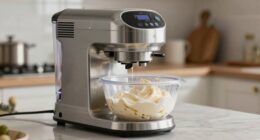Choosing between self-cleaning and manual dishwasher filters depends on your preferences for convenience and maintenance. Self-cleaning filters use grinders or disposers to handle debris automatically, saving you time, and reduce clogs and odors. Manual filters require you to remove, rinse, and scrub them regularly but offer more control over cleanliness. Both types impact performance and dishwasher longevity differently. Keep exploring to discover which system suits your needs best and how to keep your dishwasher running smoothly.
Key Takeaways
- Self-cleaning filters use grinders or disposers to automatically break down debris, reducing manual maintenance.
- Manual filters feature mesh screens that require regular cleaning every 1–3 months for optimal performance.
- Self-cleaning filters offer convenience and quieter operation, while manual filters give users more control over cleaning.
- Proper maintenance of both filter types prevents clogs, odors, and extends dishwasher lifespan.
- Self-cleaning filters typically operate more quietly and consistently, but manual filters can outperform them with regular upkeep.
Understanding Different Types of Dishwasher Filters
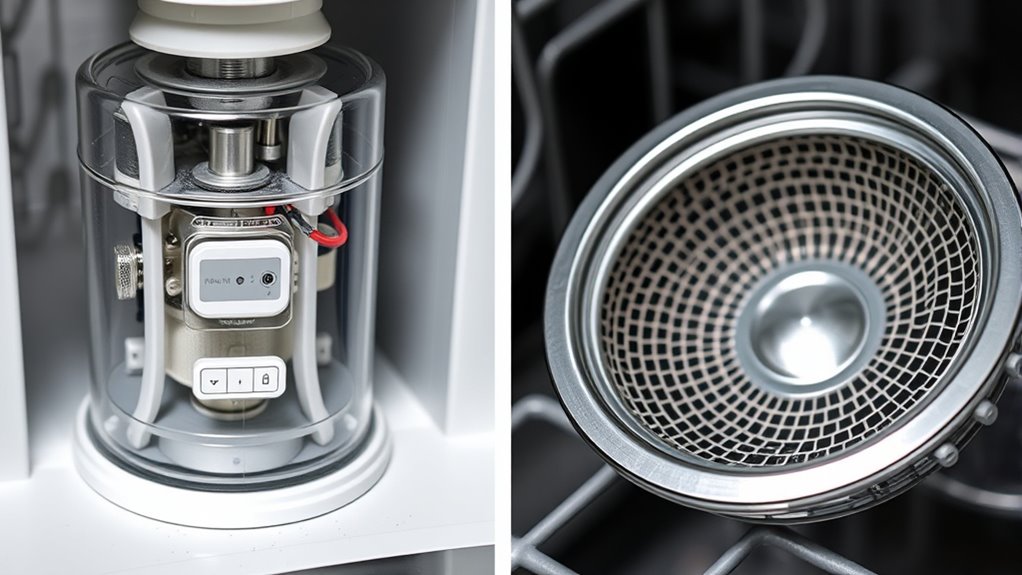
Understanding the different types of dishwasher filters is essential for maintaining your appliance’s performance. There are two main types: self-cleaning and manual filters. Self-cleaning filters use grinders or ultrafine mesh to break down food particles, washing debris away with water and preventing buildup. They tend to be noisier due to grinding mechanisms and are usually integrated into the dishwasher’s plumbing, making them less accessible. Manual filters, on the other hand, feature mesh screens or triple filter systems to trap debris, requiring you to periodically remove and rinse them to prevent clogs and odors. Located at the bottom of the dishwasher, these filters are easy to access and maintain. Understanding these differences helps you choose the right filter system and keep your dishwasher running smoothly. Additionally, filter maintenance plays a crucial role in preserving your dishwasher’s longevity and optimal cleaning performance.
Maintenance and Upkeep of Manual Filters
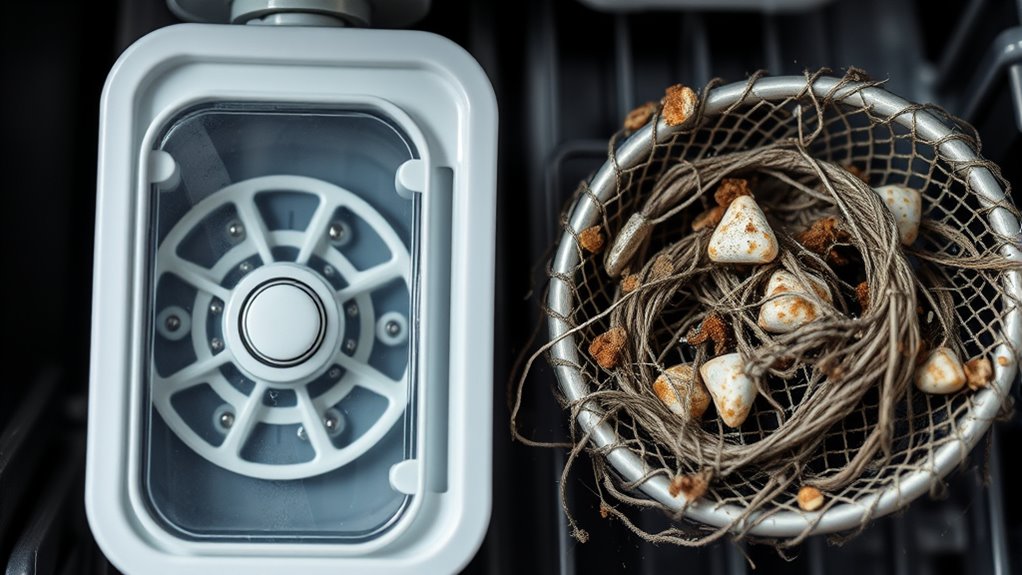
Regularly cleaning your manual dishwasher filter is essential to keep your appliance running smoothly. Follow the recommended interval of every 1 to 3 months, and watch for signs like gritty dishes or leftover debris. Avoid common mistakes like using abrasive tools or improper reinstallation, which can damage the filter and reduce performance. Incorporating proper maintenance techniques can further extend the lifespan of your dishwasher. Understanding industry trends and staying informed helps you adopt best practices for filter upkeep.
Cleaning Frequency Requirements
How often you need to clean your manual dishwasher filter depends on how frequently you run your dishwasher and how much food debris you pre-rinse. If you wash 1–3 loads weekly without scraping, clean the filter every 2 months. Heavy usage, such as 13–14 loads per week without scraping, requires weekly cleaning. Pre-rinsing and scraping food before loading can extend cleaning intervals, sometimes to once a year for light use. For moderate loads, cleaning twice a year or quarterly might suffice. Most manufacturers recommend checking and cleaning filters every 1 to 3 months to keep performance ideal. Signs like food debris, odors, or drainage issues indicate it’s time for a cleaning. Regular upkeep prevents clogs, improves water flow, and extends your dishwasher’s lifespan. Incorporating proper maintenance routines can further enhance the long-term performance and efficiency of your dishwasher.
Proper Cleaning Techniques
To keep your dishwasher running efficiently, you need to know how to properly clean and maintain your manual filter. Start by removing the lower dish rack to access the filter, usually located at the bottom of the dishwasher. Turn the upper filter a quarter turn counterclockwise and lift it out, then carefully lift and pull the lower filter forward. Rinse the filter under warm water to remove debris, soaking it if needed for stubborn residue. Use a soft brush like a toothbrush to gently scrub all surfaces, avoiding abrasive tools. Guarantee the filter is completely dry before reinstallation, aligning it properly and locking it in place. Confirm it fits snugly to prevent food particles from bypassing during cycles. Regular cleaning maintains soil and debris removal and prevents clogs.
Common Maintenance Mistakes
Are you aware that common maintenance mistakes can considerably reduce your dishwasher’s efficiency? Neglecting to clean your manual filter regularly allows food particles and grease to build up, causing clogs and odors. If you skip cleaning after heavy use or sticky foods, it worsens blockages and strains dishwasher parts. Improper filter removal—like forcing it out or misaligning it during reinstallation—can damage components or let debris bypass the filter. Using harsh tools or chemicals can tear the filter mesh, shortening its lifespan. Overlooking cleaning the filter housing, spray arms, and door seals leads to grime buildup and poor water flow. Finally, delaying replacement of worn filters decreases filtration quality, potentially harming your appliance. Regular, careful maintenance prevents these mistakes and keeps your dishwasher running smoothly. Incorporating vertical storage solutions and other organization methods can also make it easier to access and maintain your filters regularly.
Benefits of Self-Cleaning Filter Technologies
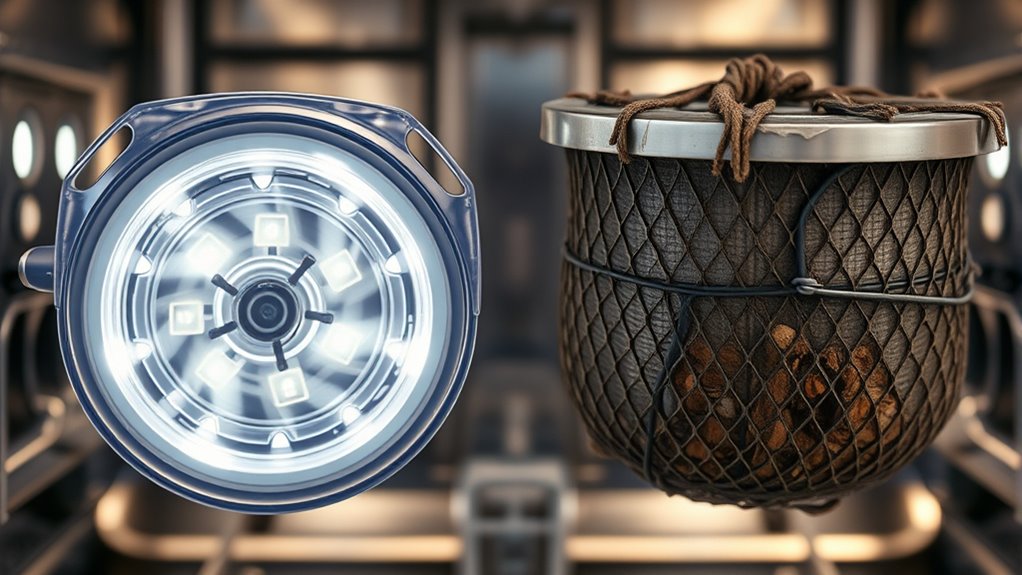
Self-cleaning filter technologies make maintenance simple by automatically cleaning during each cycle, so you don’t have to lift a finger. This continuous cleaning keeps the filter clear, which boosts your dishwasher’s cleaning power and prevents odors. Overall, these systems save you time and effort while ensuring consistently better performance. HEPA filtration can further improve the quality of the filtered water by capturing tiny particles and contaminants. Incorporating advanced filtration features can also extend the lifespan of your dishwasher by reducing buildup inside the appliance.
Effortless Maintenance Ease
Effortless maintenance is one of the key advantages of self-cleaning filter technologies in dishwashers. These systems automatically break down food debris during cycles, so you don’t need to manually remove or scrub filters. Unlike manual filters, which require frequent cleaning every few months, self-cleaning filters operate continuously with minimal intervention, saving you time and effort. They help keep your dishwasher hygienic and odor-free by pulverizing particles on the fly, reducing the risk of buildup. Maintenance becomes simpler since these filters don’t need soaking, scrubbing, or specialized tools. With less handling involved, you also avoid exposure to dirty residues. Additionally, filter longevity is improved since the continuous cleaning process minimizes wear and tear on the components. Regularly maintaining your dishwasher with self-cleaning filters can also extend the overall lifespan of the appliance. Overall, self-cleaning filters streamline your dishwasher upkeep, letting you focus on more important tasks while ensuring your appliance stays in ideal condition with minimal effort.
Enhanced Cleaning Performance
Enhanced cleaning performance is a clear advantage of self-cleaning filter technologies, as they help guarantee your dishwasher consistently delivers spotless results. By maintaining cleaner filters, your dishwasher ensures ideal water circulation and spray action, which directly improves dish cleanliness. Plus, continuous debris removal prevents food particles from redepositing on dishes and reduces odors and bacterial growth inside the machine. Additionally, rustic farmhouse design elements can be integrated into dishwasher filters through vintage-inspired finishes or decorative accents, enhancing the overall aesthetic of your kitchen. You benefit from: – Automatic flushing that prevents filter clogging and maintains filtration efficiency – Grinding or chopping mechanisms that pulverize food for easier removal – Consistent debris clearing that keeps the system working effectively during each cycle
These features work together to deliver superior cleaning, reduce maintenance, and keep your dishwasher performing at its best.
Comparing Performance and Cleaning Effectiveness
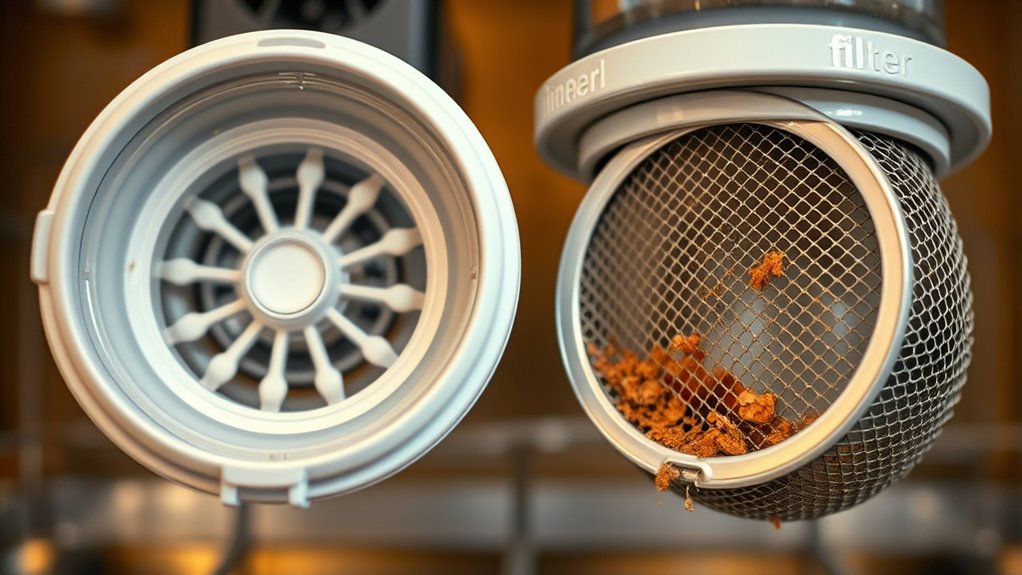
When evaluating dishwasher filters, it’s important to contemplate how well they remove food particles and keep dishes clean. Self-cleaning filters use a grinder or disposer to pulverize debris, flushing it away during each cycle, which helps maintain consistent cleaning. Proper maintenance of filters is essential for optimal dishwasher performance. Manual filters rely on mesh screens that trap debris, but they require regular cleaning to prevent clogs and food residue on dishes. If neglected, manual filters can cause poorer cleaning results and visible food bits, while self-cleaning models tend to deliver more reliable performance without user intervention. Some manual filters might outperform eco-friendly self-cleaning ones if they thoroughly trap debris. Overall, self-cleaning filters offer more consistent cleaning, but manual filters can still deliver excellent results with proper maintenance. Understanding the filter technology involved can help in selecting the right system for your needs.
Impact on Dishwasher Longevity and Reliability
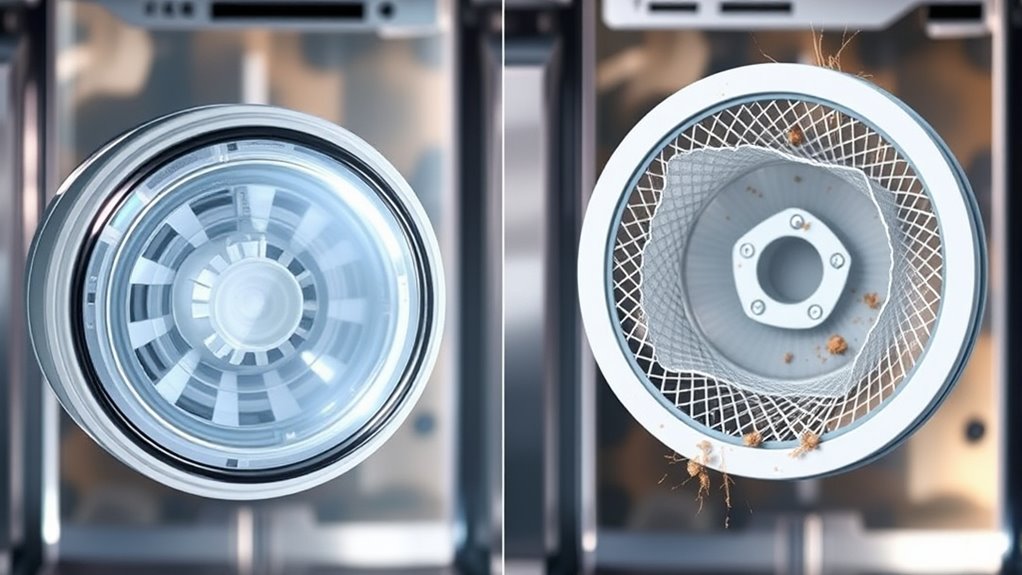
The type of filter system your dishwasher uses directly impacts its longevity and reliability. Self-cleaning filters often reduce breakdowns by preventing clogs and maintaining smooth water flow. They actively clear debris, which lessens strain on pumps and motors, helping internal parts last longer. Manual filters, on the other hand, require regular cleaning; neglecting this can cause blockages, odors, and corrosion, accelerating wear. The key benefits include:
- Reduced service calls with self-cleaning filters due to fewer clogging issues
- Lower risk of damage from debris buildup with proper maintenance
- Extended lifespan of components like pumps and spray arms
Choosing a self-cleaning system generally means fewer repairs and a more dependable dishwasher over time. Proper maintenance, whether manual or automated, is essential for maximizing your appliance’s lifespan.
User Experience and Convenience Factors
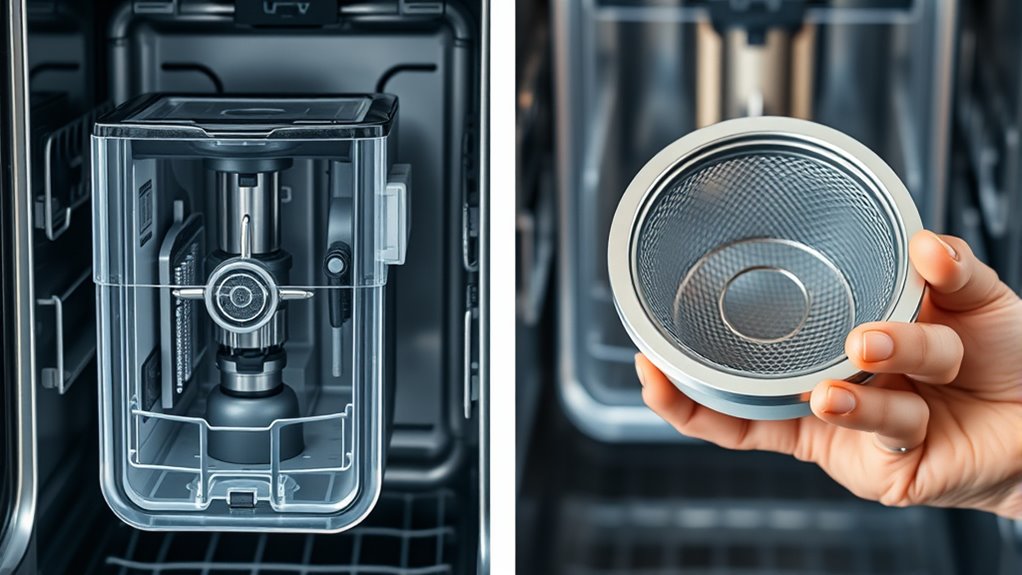
Choosing a dishwasher filter system considerably influences how convenient and easy it is to maintain your appliance daily. Self-cleaning filters offer high convenience because they require no manual intervention; food scraps are pulverized and flushed away automatically, saving you time and effort. In contrast, manual filters need regular cleaning every 2-3 months, which involves removing and rinsing the filter—sometimes with scrubbing—adding to your maintenance routine. Accessibility plays a role; some filters are designed for easy removal, minimizing inconvenience. While manual filters demand more time and effort, they give you control and reassurance over cleanliness. Self-cleaning systems eliminate this hassle but may produce some operational noise. Additionally, understanding the reliability of your dishwasher filter system helps ensure consistent performance over time. Modern filter systems often incorporate advanced filtration technology, which can better trap debris and improve water flow. Overall, your choice affects how smoothly your dishwasher runs and how much effort you spend on upkeep daily.
Noise Levels and Operational Considerations
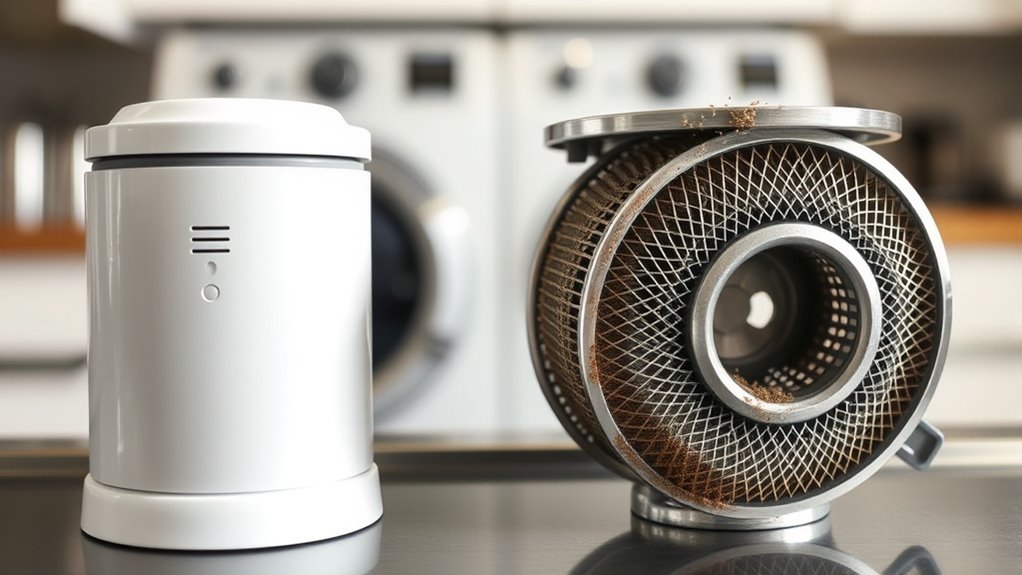
Noise levels vary considerably between dishwasher filter systems, impacting your kitchen environment during operation. Self-cleaning models with grinders, like the GE Profile, operate as quietly as 39 dB despite grinding, thanks to sound-damping tech. Manual filter units tend to be quieter during wash cycles, often near or below 44 dB, since they lack grinding motors but need manual cleaning to prevent noise spikes from clogs. Additionally, some models incorporate sound insulation to further reduce operational noise. Consider these operational factors: – Drain and water intake phases generate the loudest sounds due to pumps. – Heavy-duty cycles increase noise with higher water pressure and spray. – Drying fans or heated air add to overall noise, separate from filtration. – Engaging in hackathons can foster innovative solutions to improve noise reduction technologies in appliances. Choosing a quieter model with insulation and vibration control can improve your kitchen’s comfort and longevity of components.
Frequently Asked Questions
How Often Should I Replace My Dishwasher Filter?
You should replace your dishwasher filter only if it’s damaged, torn, or severely clogged. Regular cleaning usually suffices to keep it working well, so replacements aren’t needed often. Check your filter periodically for signs of wear or persistent issues like bad odors or dirty dishes after cleaning. If cleaning doesn’t improve performance or the filter is beyond repair, then it’s time to replace it to guarantee your dishwasher runs efficiently.
Are Self-Cleaning Filters More Expensive Upfront Than Manual Filters?
You’ll find that self-cleaning filters cost about 20-30% more upfront than manual filters. This is because they are typically part of more advanced, feature-rich dishwashers with integrated technology. While the initial investment is higher, you might save money over time with less maintenance and longer-lasting filters. Keep in mind, the higher cost reflects the added convenience of automated cleaning, making them a smarter choice if you value ease.
Can DIY Maintenance Extend the Lifespan of Dishwasher Filters?
Yes, DIY maintenance can prolong the lifespan of your dishwasher filters. By regularly removing and rinsing debris, using soft brushes, and inspecting filters, you prevent clogs and reduce strain on your machine. Frequent cleaning minimizes buildup, odors, and mechanical stress, helping your dishwasher last longer—potentially beyond the typical 10-year lifespan. Consistent care ensures your dishwasher operates efficiently, saving you money on early replacements and repairs.
Do All Dishwashers Come With Built-In Filter Systems?
You can’t judge a book by its cover, and that applies to dishwashers too. Not all dishwashers come with built-in filter systems; some rely on manual filters, while others have self-cleaning ones. When shopping, check the model’s features because filter systems vary widely by brand and age. If you want low maintenance, look for self-cleaning filters, but be prepared for more noise.
What Signs Indicate That a Dishwasher Filter Needs Cleaning or Replacement?
You’ll notice your dishwasher needs cleaning or replacement when dishes come out with food residues, stains, or a gritty texture. Unpleasant odors, slow drainage, or water pooling are key signs. Check for visible debris in the filter or spray arms, and listen for noises or error codes during cycles. If you see food buildup, discoloration, or cloudy glassware, it’s time to clean or replace the filter to restore ideal performance.
Conclusion
Choosing between self-cleaning and manual dishwasher filters is like selecting a trusted partner for your daily routines. Imagine a dishwasher that works quietly in the background, effortlessly maintaining itself, ensuring sparkling dishes every time. Whether you prefer the convenience of self-cleaning or the hands-on satisfaction of manual filters, your decision shapes the heart of your kitchen. Make a choice that brings peace of mind and keeps your home running smoothly, like a well-oiled symphony.









